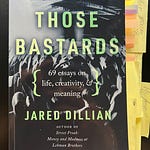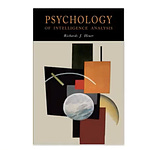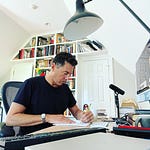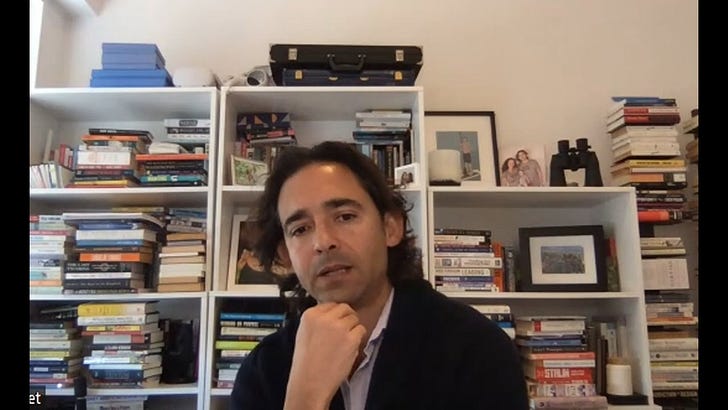Hello everyone.
I’m very excited to share my conversation with Sebastian Mallaby, the Paul A. Volcker senior fellow for international economics at the Council on Foreign Relations and author of several books including More Money Than Good, The Man Who Knew: The Life & Times of Alan Greenspan, as well as an upcoming book about the history of venture capital (The Power Law). I’m a big fan of More Money Than Good and tweeted about the gems in its footnotes. This conversation was an absolute treat and I hope you will enjoy it as much as I did.
You can access it here: Spotify, Apple, Google, RSS, anchor.
I’m still learning about editing the audio files and dealing with all the logistics. Happy about any feedback🙏
Disclaimer: this podcast is for entertainment purposes only. It does not constitute an offer to sell or the solicitation of an offer to buy any securities mentioned or discussed. Seek your financial, tax, legal, accounting, or other advisor’s advice before making any investment decisions. Do you own work. I am are not your fiduciary or advisor.
Conversation highlights:
2:00: Sebastian’s journey to the book and topic (hedge funds, also Alan Greenspan)
5:15: How to gain access and build trust.
“The key was to do an unreasonable amount of preparation work.”
“You win people's respect by doing a ton of homework. It shows that you're serious and you're not wasting people's time by asking the obvious questions.”
7:44: How to decide what questions to ask?
“What you really want to know from them is specifically what their thought process was around a particular important or interesting trade. How did they make the call? How did they develop conviction? How did they hold onto the position during the inevitable hiccups and adversity? So it's that reconstruction of the case study.”
“I often show up with very detailed notes where I've reconstructed a timeline. And I'm able to say that, ‘I know from your investor letter that in this month you made a profit on dollar/yen. I know that dollar/yen had a big move on the 15th and 16th of that month. … I really tried to kind of prompt them as much as possible.”
11:00: Where to look for information? “The answer is you've got to look everywhere.”
12:20: Finding memos in which Greenspan “described the creation of the Federal Reserve as one of the historic disasters in U.S. history.”
15:00: George Soros who joked "I can only remember the future."
“When you ask him about the past, he's not much help.”
Learning the division of labor in the Soros team and the Thai Bhat trade.
20:00: “The culture within an investment company matters almost as much as the analysis that the company does of the market or of the trade.”
21:00: The Korean bank trade.
“On the walls of these offices they have these tombstone announcements, underwriting such and such deals. And he sees that these Korean financial institutions announcing in these framed plaques on their walls, that they've done these financings for Thai real estate companies. And of course he knows, because he was there, that all these real estate companies are bust, they’re gone, finished.”
23:00: “The South Korean reserves are fictitious, the government is lying. And when you see that as a currency trader, you know that if you go short the currency, they're not going to have the reserves to defend it, and you're going to win. It will be the Sterling trade all over again.”
27:00: Different cultures and investment styles, contrasting Soros, Druckenmiller and Robertson.
31:30: Culture at Tiger and the Tiger cubs.
“That's sort of the DNA of Tiger, as far as I understand it today, that you've got people who don't mind hustling, who don't mind getting on a plane, flying to another country, meeting the manager, and building a very personal network. And that continues to generate good returns.”
34:00: Julian Robertson outgrowing his original strategy and the loss of “supercharged incentives.”
“The other thing that went wrong for junior Robertson in the late nineties was that he had diversified out of stocks and into macro. He was doing currency trades and he had a dollar/yen bet. They went extremely wrong and that was the beginning of his losses. When he also got hit by the NASDAQ bubble, it was sort of a double whammy.”
“It's not so much that people can't adapt over time. I think they actually can. It's more that when you diversify from one type of hedge fund strategy into another one, that's the risk. It's the mission creep thing.”
“It's that supercharging of incentives that really focuses the mind and makes people perform at their best.”
39:30: Can investors evolve and adapt?
“Sometimes the competitive advantage of a hedge fund manager is precisely the ability to adapt. George Soros used to say, ‘I don't play the game. I look for changes in the rules of the game.’”
42:00: Mindset and personality.
“The value investing mindset almost disqualified Robertson from mastering macro.”
“I think a big thing that people don't necessarily understand when they're outside the hedge fund world is that it's not just about being right in trading. It's about the sizing of the trade and the fact that you can be wrong more often than are right, but if you size those bets when you were right bigger, you will still make money. And that I think is sort of like the key insight about someone. Paul Tudor Jones.”
47:45: Understanding Paul Tudor Jones.
“Genius does not always understand itself.” Vic Braden
49:00: Jones tried to replicate his system with a quant.
52:00: The Lehman Brothers 2008 trade.
55:00: “If you see that same 50:50 chance in the way that a trader like Paul Tudor Jones does, then you realize that the Hank Paulson view was crazy. And it's crazy because in a world where there's a 50% shot that it would be a flat outcome for Wall Street, but then a 50% shot that [the market] will tank, every sensible macro trader with a Paul Tudor Jones mindset will be massively short because you can't lose. It's an asymmetric bet. If you perceived their symmetry, then in a way it's no longer 50:50, it's like a hundred percent it’s going down.”
56:50: Jones’s process and his ‘market scripts.’
“Sometimes causation in human actions works in a weird way.”
“I remember him saying this to me when I went to see him. Sitting in the evening when the markets were closed and thinking through what might happen the next day, thinking about the different scenarios that could arise, thinking what he would do. If option A was to transpire, he would do trades one and two. If option B happened, he would do something else. And he kind of thinks through all these things through in advance and that quiet reflection when the markets are closed makes his faster when the markets are open. Cause he's kind of been there in his head.”
59:45: Reflecting on the industry and book from today’s perspective, a decade later.
1:03: Rise of quantitative trading.
“Because of those high barriers to entry, you tend to get these concentrated pools of excellence in a few big quant shops and the survival rates for quants are higher. So this all changes the game. It's less of a kind of Darwinian competitive adaptive ecosystem, which is what I saw in the discretionary trading world.”
“On the other hand, human traders are good at interpreting the arrival of new paradigms. What does it mean for markets when you have a pandemic or what does it mean for markets when you have a pandemic and then an unprecedented fiscal and monetary stimulus. And so this is like when you have unknown territory and the past patterns in markets won't necessarily repeat themselves. You need people who look into the future. You don't need machines to look into the data from the past.”
1:08: Sebastian's upcoming book, The Power Law.
If you enjoy my work, please consider sharing it with friends who might be interested. It would mean a lot to me and help me turn this into a sustainable effort. 🙏















Author Sebastian Mallaby on Understanding Legendary Investors